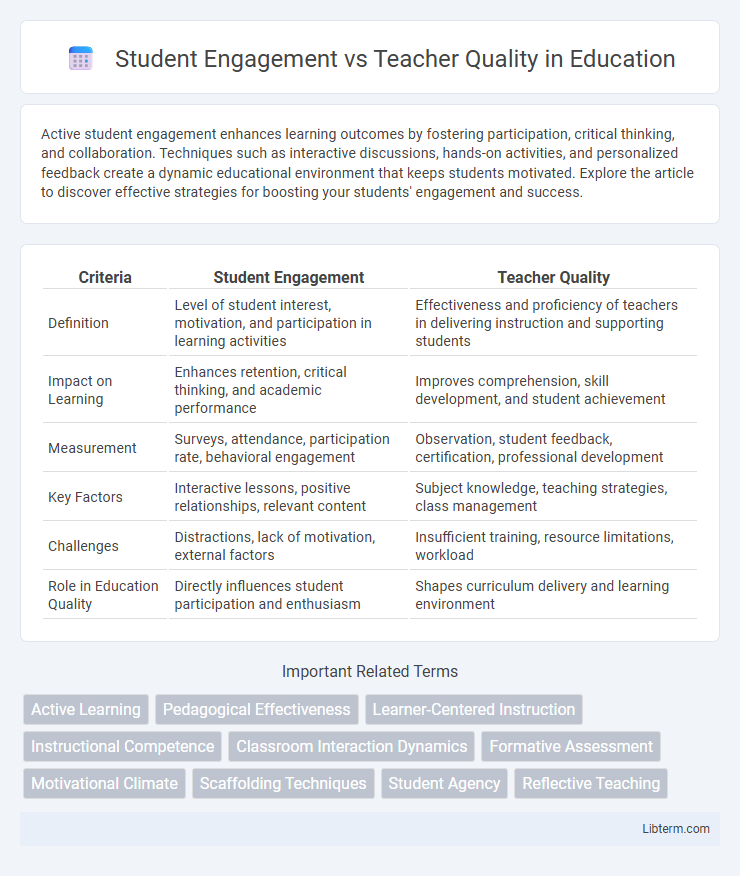Active student engagement enhances learning outcomes by fostering participation, critical thinking, and collaboration. Techniques such as interactive discussions, hands-on activities, and personalized feedback create a dynamic educational environment that keeps students motivated. Explore the article to discover effective strategies for boosting your students' engagement and success.
Table of Comparison
| Criteria | Student Engagement | Teacher Quality |
|---|---|---|
| Definition | Level of student interest, motivation, and participation in learning activities | Effectiveness and proficiency of teachers in delivering instruction and supporting students |
| Impact on Learning | Enhances retention, critical thinking, and academic performance | Improves comprehension, skill development, and student achievement |
| Measurement | Surveys, attendance, participation rate, behavioral engagement | Observation, student feedback, certification, professional development |
| Key Factors | Interactive lessons, positive relationships, relevant content | Subject knowledge, teaching strategies, class management |
| Challenges | Distractions, lack of motivation, external factors | Insufficient training, resource limitations, workload |
| Role in Education Quality | Directly influences student participation and enthusiasm | Shapes curriculum delivery and learning environment |
Understanding Student Engagement
Understanding student engagement involves analyzing cognitive, emotional, and behavioral dimensions that influence learning outcomes. High student engagement correlates directly with improved academic performance, attendance, and motivation, while lower engagement often signals risk for academic failure. Effective teacher quality enhances student engagement by employing adaptive instructional strategies, fostering positive classroom environments, and maintaining clear communication channels.
Defining Teacher Quality
Teacher quality encompasses the qualifications, instructional skills, and effectiveness in promoting student learning outcomes. Key indicators include subject matter expertise, classroom management, and the ability to foster critical thinking and engagement. Research consistently links high teacher quality to increased student motivation, achievement, and sustained academic success.
The Interplay Between Engagement and Teacher Performance
Student engagement significantly influences teacher quality by providing real-time feedback on instructional effectiveness, enabling teachers to adapt strategies for diverse learning needs. High teacher performance fosters environments that motivate students, enhancing cognitive and emotional investment in learning tasks. This dynamic interplay creates a positive feedback loop, where engaged students and skilled teachers collectively improve educational outcomes.
How Teacher Quality Influences Student Motivation
Teacher quality directly influences student motivation by fostering a supportive and challenging learning environment, which encourages active participation and intellectual curiosity. High-quality teachers employ diverse instructional strategies, provide meaningful feedback, and demonstrate enthusiasm that boosts students' intrinsic motivation to excel. Research shows that motivated students achieve higher academic performance, highlighting the critical role of effective teaching in shaping student engagement.
Measuring Student Engagement in the Classroom
Measuring student engagement in the classroom involves assessing behavioral, emotional, and cognitive participation through tools like observation checklists, student surveys, and digital analytics. Metrics such as time on task, interaction frequency, and self-reported interest levels provide insights into engagement patterns and correlate with academic outcomes. High-quality teacher practices, including clear instruction and adaptive feedback, significantly influence measurable increases in student engagement.
Factors Shaping Teacher Effectiveness
Teacher effectiveness is influenced by factors such as subject mastery, pedagogical skills, and classroom management, which directly impact student engagement. Continuous professional development and reflective teaching practices enhance instructional quality and responsiveness to diverse learning needs. Supportive institutional environments and access to resources also play critical roles in shaping teacher performance and fostering student motivation.
Classroom Strategies for Boosting Engagement
Employing interactive classroom strategies such as collaborative group work, real-world problem-solving, and technology integration significantly boosts student engagement by making lessons more relatable and dynamic. High-quality teachers who use formative assessments and differentiated instruction adapt to diverse learning styles, thereby increasing participation and motivation. Research shows that student engagement directly correlates with academic achievement, emphasizing the importance of teacher-led instructional methods that actively involve students in the learning process.
The Role of Professional Development in Teacher Quality
Professional development plays a crucial role in enhancing teacher quality by equipping educators with updated instructional strategies and subject knowledge, directly impacting student engagement levels. Targeted training programs improve teachers' ability to create dynamic, inclusive classroom environments that foster active participation and motivation among students. Ongoing professional development ensures teachers remain adept at addressing diverse learning needs, thereby promoting higher academic achievement and sustained student interest.
Balancing Student Needs and Instructional Quality
Balancing student needs and instructional quality requires a nuanced approach that aligns student engagement with teacher effectiveness. Effective teachers employ adaptive strategies that address diverse learning styles and foster active participation, enhancing comprehension and motivation. Prioritizing ongoing professional development alongside responsive classroom practices ensures both high instructional quality and sustained student engagement.
Enhancing Educational Outcomes: Engagement vs Teacher Quality
Student engagement significantly boosts academic achievement by promoting active participation and deeper learning, while high teacher quality ensures effective instruction and personalized support. Research shows that combining strong teacher expertise with strategies that increase student involvement leads to improved retention rates and higher standardized test scores. Prioritizing both elements in educational policies fosters a dynamic learning environment essential for maximizing student success.
Student Engagement Infographic

 libterm.com
libterm.com